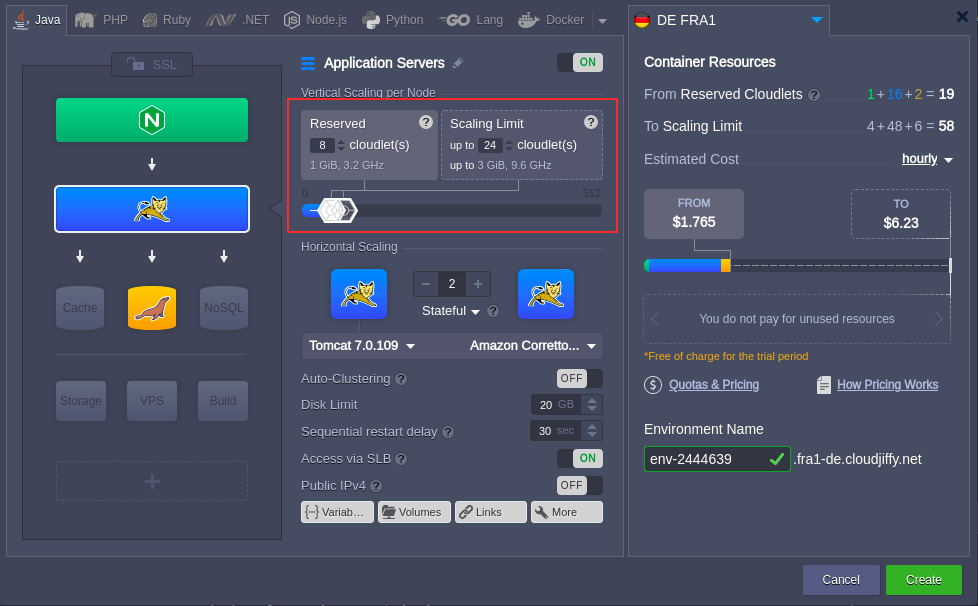At CloudJiffy Platform, consumed by container resources are measured in cloudlets - a special measurement unit, which includes 128 MiB of RAMand 100 MHz of CPU power simultaneously.

1 Cloudlet = 128 MegaBytes RAM + 100 MHz CPU
8 cloudlet = 1 GB RAM + 800 MHz CPU
1 core = 3.2 GHz
Being highly granular, it allows me to accurately determine the required capacity for each server in the environment, which ensures the truly fair usage-based pricing so I do not overpay for the unused resources.
Note that in contrast to RAM consumption (with MiB=1024 KiB unit), usage of disk space and network traffic is measured in megabytes (1000 KB).
Below, we’ll consider which types of cloudlet are used at Cloudjiffy, how the cloudlet consumption is calculated and where to track my resource usage.
Cloudlet Types
There are two types of cloudlet at CloudJiffy, available to be setup for every server in environment via the Vertical Scaling per Node topology wizard section: Reserved and Dynamic.
Herewith, if a layer contains multiple nodes, these limits are configured for all of them at once, i.e. are stated equal for each instance.

Here, each toddler corresponds to a particular cloudlet type:
Reserved Cloudlets - these ones are reserved in advance and will be charged irrespective of my actual resource usage. In exchange, I’ll get significant automatic discounts based on their number.
Dynamic Cloudlets - are added & removed automatically according to the amount of resources that are required by my application in a particular moment of time - i.e. they’re assigned when load goes up and removed again as soon as it drops down. As a result, I pay based on my actual resource usage.

- This type of cloudlet helps to cope with unexpected surges in demand without any pre-planning, special coding or overpaying for resources I won’t need the majority of time. In such a way, with the Dynamic Cloudlets slider I set the container’s Scaling Limit, defining the maximum possible number of cloudlets available to be allocated for it.
In order to gain the maximum profit, it is recommended to use Dynamic Cloudlets alongside with the Reserved Cloudlets to get all the advantages of my application’s automatic vertical scaling and, simultaneously, to benefit on automatic discounts.
Cloudlet Consumption Calculation
Number of used cloudlets is calculated on hourly basis in the following way:
- for RAM - the peak value (i.e. the highest RAM consumption over the hour)
- for CPU - the average usage
The greater of these values (but not both of them combined) is considered as the actual environment consumption, which will be charged from my account according to the provider’s tariff (check it within Quotas & Pricing information frame).
For example, if during one hour my average CPU usage is 600 MHz (6 cloudlets), and my highest RAM usage is 1024 MiB (8 cloudlets), I’ll be charged for 8 cloudlets only - not for the combined total of 14 units.
Consumption Tracking
The current resource usage of my environment in general and for every layer/node it comprises in particular can be seen within the corresponding Usage column at dashboard:

And in order to review my servers' consumption level for a particular period of time, I can use the corresponding Statistics section or check the applied account charges within my Billing History.